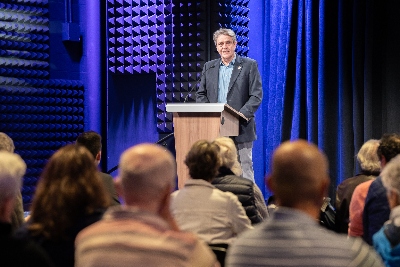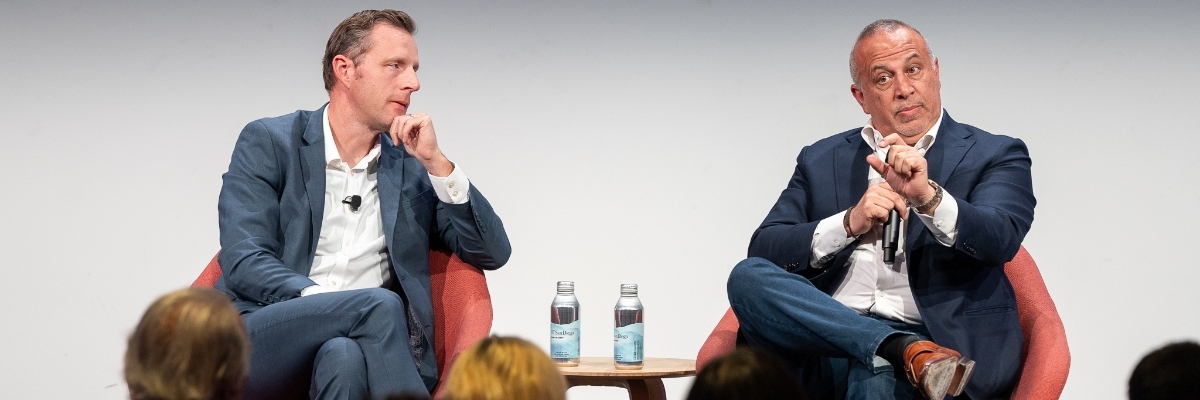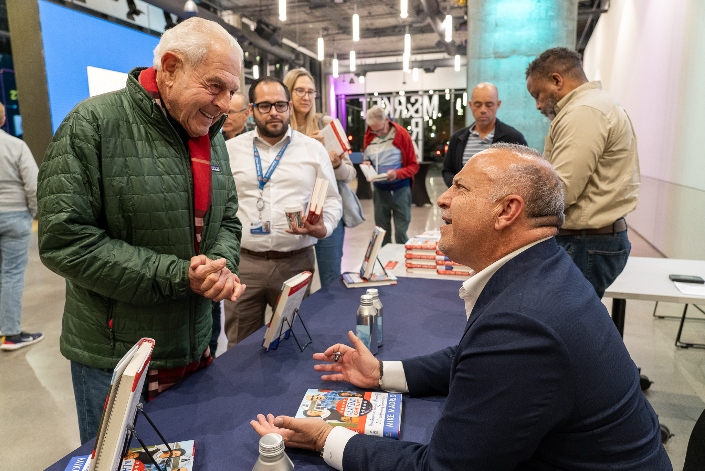‘The Great Transformation’: Mike Madrid Talks Shifts in Politics, Institutions & Latino Influence at Helen Edison Lecture
Division of Extended Studies Hosts Nationally Recognized Latino Voting Expert at UC San Diego Park & Market
Media contact:
Published Date
Article Content
Polarization is an ongoing and prominent feature of American politics, with emotions from the recent presidential election still fresh. The election highlighted stark contrasts in voter preferences and turnout strategies, further revealing geographic and ideological divides. This begs the question: can American society move beyond the red-versus-blue, all-or-nothing construct of the day? Veteran political consultant Mike Madrid is optimistic.
On December 2, Madrid, author and nationally recognized expert on Latino voting trends, joined the UC San Diego Division of Extended Studies Helen Edison Lecture Series for an in-depth discussion on the changing state of American politics and institutions.
Madrid is the principal at California-based public affairs firm Grassroots Lab and author of “The Latino Century: How America's Largest Minority Is Transforming Democracy,” published in June 2024.
His thesis on Latino voters at Georgetown University became the basis for his pioneering work in Latino communications and outreach strategies in California, Texas, Florida, and nationwide. He has served as press secretary for the California Assembly Republican leader and as the political director for the California Republican Party. He is also a co-founder of The Lincoln Project, a pro-democracy organization dedicated to the preservation, protection, and defense of democracy.

UC San Diego Extended Studies Dean Hugo Villar opened the evening with remarks highlighting the significance and impact of the Helen Edison Lecture Series in advancing the Division's mission, commenting that it is “a way for us to advance the conversation on critical topics that serve our larger community.”
“When planning the Helen Edison Lecture this season, there was a monumental task in programming a speaker who could complement the presidential election. With an increasingly divided political environment, we wanted this lecture to bring our community together through a shared understanding,” said Andrew Waltz, Director of Arts Management at UC San Diego Division of Extended Studies.
A new era of transformation
At UC San Diego Park & Market, Madrid took the stage in the Guggenheim Theater, introduced by moderator, public policy expert, and author Zach Friend. He began by addressing the monumental shifts happening in American society as we enter the digital age. Acknowledging how easy it is to focus on what's falling apart, he stressed that what's truly needed is an understanding of what must change to fix it.
He framed recent election results as part of a much bigger, ongoing evolution he calls “the great transformation”—a shift tied to the global embrace of the digital age and its impact on institutions like government, the media, academia, and religion. Basically, all the things we rely on to keep society running smoothly.
"I think about the change our species went through from the agricultural era into the industrial age and the extraordinary stressors of that on society. There were things we had never dealt with before. But we figured it out, and we're in the process of figuring that out now, as we are fully, deeply ensconced in the digital age."
Questioning the viability of our institutions in a digital age
Madrid pointed out that the systems and structures we've constructed have been designed around a very different world. For centuries, society has worked in a hierarchical system, where power flowed from the top down. But in the digital age, that approach simply doesn't work, which is why we're seeing a collapse in trust and confidence in our institutions. He explained that what we're witnessing now isn't just political division but a full-blown crisis of confidence in the structures that hold everything together.
I think about the change our species went through from the agricultural era into the industrial age and the extraordinary stressors of that on society. There were things we had never dealt with before. But we figured it out, and we're in the process of figuring that out now, as we are fully, deeply ensconced in the digital age.

Madrid shared examples of how the Democratic Party is now taking stances on things that, just a few decades ago, would’ve been more typical of Republicans—for instance, the party’s stance on border security, energy policy and corporate tax cuts. The Republican Party, meanwhile, has shifted to a more isolationist, protectionist position, with its leader running on a platform that included the largest tax hikes in U.S. history.
"Something is changing. None of these parties make sense until you understand that our institutions don't make sense,” he noted.
This dramatic shift, Madrid argued, can't be understood without recognizing the changing nature of our institutions in the digital age. As information flows horizontally rather than vertically, we've lost trust in the traditional power structures that were once the foundation of society. Government, academia, and the media don't have the same sway they used to, and confidence in them is at historic lows. This has led to a deep sense of disillusionment, with more Americans believing that elections are rigged or that the American system itself is "stolen."
U.S. demographic revolution
Madrid also dove into the impact of demographic changes, especially the shift toward a non-white majority in the U.S. By 2040, the U.S. will be a majority-minority country, with Latinos playing a major role in shaping the future. He pointed out that we're seeing a significant shift among Latino voters—especially in California—where there's been a rightward shift in the Latino vote, something that seemed unthinkable a few decades ago. This shift has sparked some surprising results, like the recent shift in Latino opinions on immigration. He pointed to a recent poll by the UC Berkeley Institute of Governmental Studies and the Los Angeles Times that found that 63% of Latinos in California agreed undocumented immigrants are a “burden” on society— the same percentage of white Californians who in 1994 voted for Proposition 187, a controversial immigration initiative.
What's happening now, he said, is not just the usual story of assimilation that we've seen with other immigrant groups in American history. In California, the Latino experience is unique for several reasons, including the sheer size and duration of the immigration wave from Latin America, the proximity to Latin America, and the role of technology in keeping Latinos connected to their home countries in ways previous generations didn’t experience.
This effect, he argued, is why we're seeing a more complex, changing identity—one where Latinos are both becoming more American and influencing mainstream American culture.
“Latinos are melting into the pot of America as much as the mainstream pot is melting into a changing Latino identity. How else do you explain things like the popularity of Bad Bunny, the top-selling music artist who doesn't sing a word of English in any of his songs? His songs are not purchased exclusively by Latino buyers; they're also consumed by mainstream English buyers. The explosion of soccer comes along with it, which will soon be our national pastime. This transformation means that America is becoming Latino as much as Latinos are becoming American."
Madrid also pointed out that one of the key dynamics reshaping American politics is the growing education gap. As more Latinas are graduating from college, they're driving the political shift to the left, while Latino men—especially those working in labor-intensive industries like construction—are moving more to the right. This creates a kind of social divide, where education and gender are increasingly determining political allegiance.
Latinos are melting into the pot of America as much as the mainstream pot is melting into a changing Latino identity. How else do you explain things like the popularity of Bad Bunny, the top-selling music artist who doesn't sing a word of English in any of his songs?...This transformation means that America is becoming Latino as much as Latinos are becoming American.
Optimism about America’s evolution
In the end, Madrid's lecture was about understanding how America got to this point—where our institutions are faltering, politics is increasingly polarized, and demographic shifts are transforming the country. He offered a thoughtful take on how we might repair these rifts, calling for a deeper understanding of how these changes fit into the larger story of America's evolution, especially as we continue to adapt to the digital age.
“I'm not here to instill fear. Despite all of this, I'm actually extraordinarily optimistic about where we are heading, because regardless of who won this election, there was never ‘going back,’ to put it in Kamala Harris's words,” he expounded. "We can't roll this back to a pre-2016 era when everything was working. It's not working. It hasn't been working. It's working less and less all the time. And we need to radically, dramatically reimagine and transform our institutions in a way that, candidly, people of my age and older aren't capable of doing any more than a 50-year-old farmer coming out of upstate New York, coming down into Lower Manhattan in 1920 could imagine building a 90-story skyscraper.”
Madrid argued that this moment in history—when our sense of community feels upended and our faith in our institutions is faltering—is precisely the spark of urgency we need to reimagine those institutions, imparting values and cultural characteristics that go back generations.
After an insightful Q&A with the audience, the event concluded with a book signing in Park & Market’s Forum lobby, providing an opportunity to engage directly with Madrid and lecture moderator and public policy expert Zach Friend.

Mike Madrid signs copies of his book, “The Latino Century: How America's Largest Minority Is Transforming Democracy,” published in June 2024.
Keep engaging with the Helen Edison Lecture Series
The full broadcast of Madrid’s intriguing lecture, including the Q&A session, will be made available by UCSD-TV, accessible on the Helen Edison Lecture Series website.
The Helen Edison Lecture Series presents events throughout the year. All Helen Edison lectures are open to the public and free to attend. For more information, visit UC San Diego Division of Extended Studies online.
“It was incredibly moving to hear Madrid speak to a packed room and hear the heartfelt discussions with the audience,” said Waltz. “I encourage the community to watch event broadcasts on UCTV and plan to join us in person for the 2025 series.”
To give a gift to help build the endowment for the future of the Helen Edison Lecture Lectureship Series, donate here.
Share This:
You May Also Like
Stay in the Know
Keep up with all the latest from UC San Diego. Subscribe to the newsletter today.




